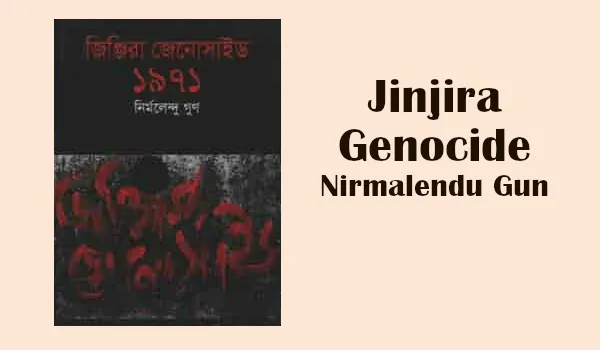Book on Liberation War of Bangladesh - Jinjira Genocide - Nirmalendu Gun
Dedication: In memory of Girish Chandra, the pioneer brother of secularism.
In 1971, there was a war of liberation in Bangladesh. Many incidents of that war remain unknown to the world. We need to know the terrible events that are happening all over the country. Everyone should know the indescribable atrocities committed by the West Pakistanis on the Bangladeshis. To that end, today I am discussing the book 'Jinjira Genocide' written in Bengali, written by the poet Nirmalendu Gun.
This book is an extension of the 'Jinjira Genocide' section of the book 'Autobiography 1971' written by the poet Nirmalendu Gun. In the great war of liberation Pakistani forces carried out barbaric killings on the people of Bangladesh. They entered the village one by one with the local razakars and shot the suspect in front like a bird. In the evolution of time many events are erased from the minds of people. The 'Jinjira Massacre' or 'Jinjira Genocide' is such an event that is going to be buried in the bottom of history.
On 2 April 1971, the Pakistani army fled from Dhaka as planned and indiscriminately attacked the people who had taken refuge in the Jinjira area. Poet Nirmalendu Gun himself was present at that horrible incident that day. He described what he saw with his own eyes emotionally. He compared the incident to the Mỹ Lai genocide in Vietnam. On the night of March 25, Pakistani troops launched an armed attack on the sleeping people of Bangladesh. Panic spread across the country. Many ordinary people living in Dhaka fled in fear. Nirmalendu Gun, like others, went to the Jinjira area of Dhaka to cover his body temporarily.
On the morning of 2 April 1971, the Pakistani army launched an attack on the village of Shubhadya in the Jinjira area of Keraniganj. The attack, which lasted until noon, killed thousands of people. In the book 'Documents of the War of Independence' it is clearly written that the attack took place between five in the morning and two in the afternoon. This Hindu-dominated region sheltered all the Hindus and Muslims who had fled from Dhaka. No Hindu-Muslim survived the indiscriminate shelling that began on the morning of April 2. Everyone's blood was mixed together in the soil of Shubhadya village.
Nirmalendu Gun wrote the history of the war of liberation from the heart. He is mainly a poet, his main work is the practice of emotions. He did not remain indifferent like the historians in composing the history of the war of liberation. In describing an event, more relevant events are drawn from memory. Mentioned necessary data. Nana has sincerely described philosophical perceptions with relevant considerations. For example, he was fleeing when the shots were fired. Sometimes he hid behind the walls of the mosque, sometimes he hid in a pond of water hyacinth. The Pakistanis were firing back with machine guns and mortar shells. Like everyone else, he was trying to save his life. Entering the kitchen of a deserted house, he thought he would never run away again; Don't rush. Do not take any new initiative to save lives. Such is his philosophical feeling in such a situation.
When I agreed to die, I saw a huge load come down from inside my chest. I felt very dependent. Understood, that was the burden of life.
During the horrific genocide that took place on April 2, 1971, Nirmalendu Gun witnessed the atrocities of the Pakistanis up close. They have got proof of how precious the life of Bengalis is to them. Nirmalendu Gun saw a horrible scene while fleeing in the rain of bulets.
Sitting in a ditch, I witnessed a tragic death that I will never forget. Couldn't. I see the shell hit the head of a running man, his head detached from the body of the drowning man in the pool I was hiding in, but the man is still running. He had no idea that his head had been blown away by the shell. After passing some distance with the decapitated body, the man could no longer do it, his body fell to the ground. The soil of Shubhadar was drenched in a small stream of blood from the headless body.
Many incidents of the liberation war remain unknown to us. Many could not have imagined the brutality of the nine-month-long genocide. Numerous other killings like 'Jinjira Genocide' took place in Bangladesh. By writing a book about one of the events that took place in the villages, Nirmalendu Gun wanted to repay the responsibility of history, albeit a small one. More books need to be written on such genocides in Bangladesh. May many forgotten histories be unveiled to the new generation. Expect extensive publicity and reading of the book.
~~~~~~~~~~~~~~~~~~~~
Jinjira Genocide - Nirmalendu Gun
Publisher: Chayabithi, Dhaka
First published: 2012
Cover: Dhruv Ash
Jinjira Genocide -Nirmalendu Gun
Publisher: Chayabithi, Dhaka, Bangladesh
First published: 2012
Cover: Dhruv Ash
Price: Rs. 130.00, Page: 88





Thank you for the book review.
ReplyDelete